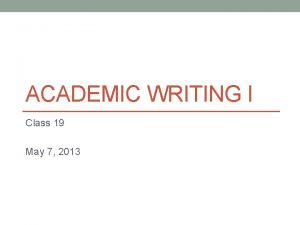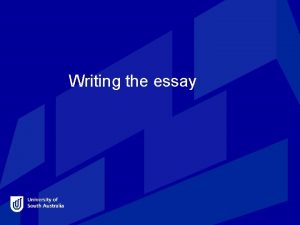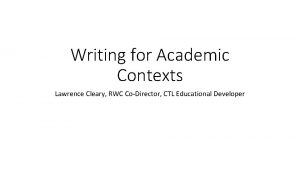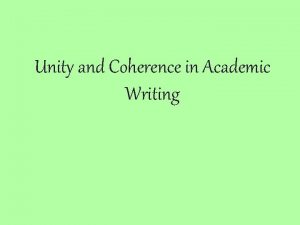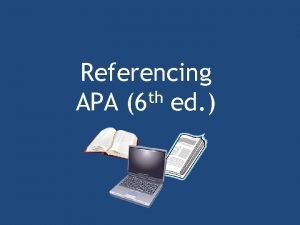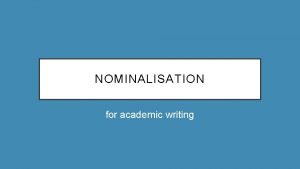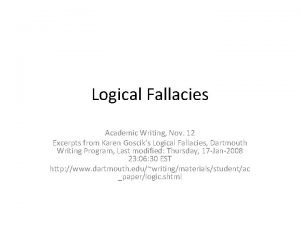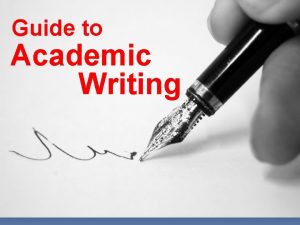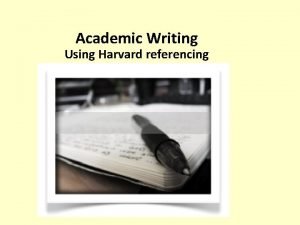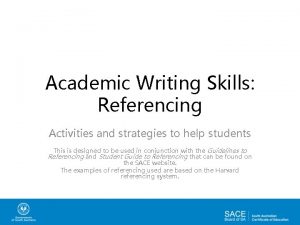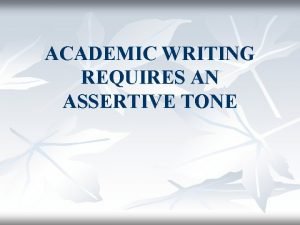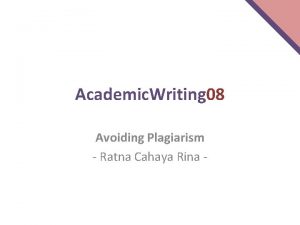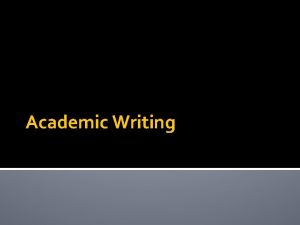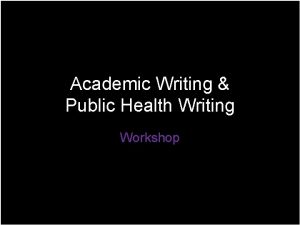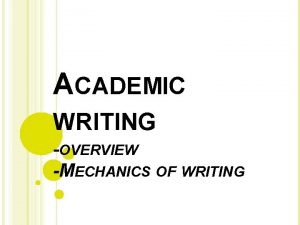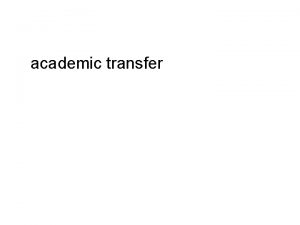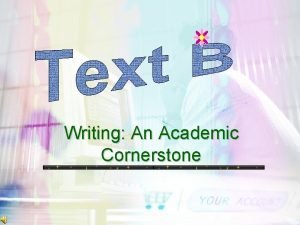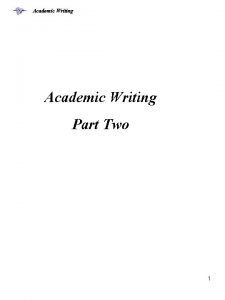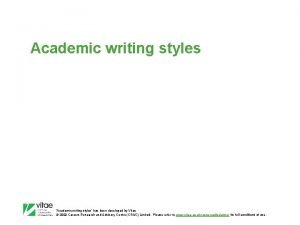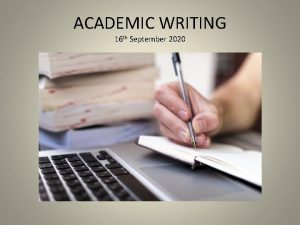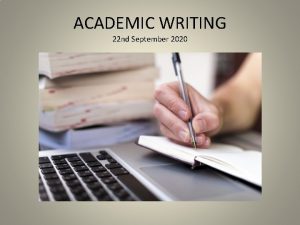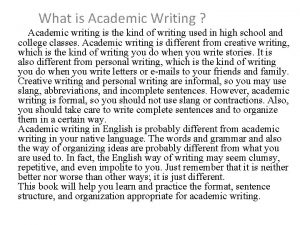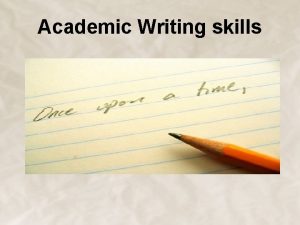Academic Writing What is academic writing Academic writing
















- Slides: 16

Academic Writing What is academic writing? • Academic writing is the kind of writing that you are required to do at university. • In academic writing, your audience is primarily your teachers or instructors, and friends. • Academic writing is a “process” not a “product” • Individual HW: writing 1 quotation from 1 reference for the writing theme. Submit next week.

What is Academic Writing? Why do you Write? • To compare or contrast two topics • To argue for a solution to a problem • To summarize information • To report on a laboratory experiment or research

What is Academic Writing? • How do you Write? -write clearly and use correct grammar, spelling, and punctuation In academic writing you can use two formats: paragraph and the essay.

What is Academic Writing? • The style in academic writing formal style This means that their language should be clear and direct and that they should not use slang.

What is Academic Writing? • To whom do you Write? The purpose of writing is communication, all writers need to be aware of their audience. The question here is: Who is the audience for students? However, the purpose of writing is still the same: to communicate a message.

Pre-writing strategies The purpose of this step is to think about a certain topic and generate as many ideas as possible. Don't worry about spelling, grammar, or writing in complete sentences.

Pre-writing strategies There are four techniques which help you to generate ideas, they are: • Journal Writing The advantage of this technique is that you are writing only for yourself. You can write down your thoughts and explore ideas without worrying what other people will think. • Listing In this technique, you think about your topic and quickly make a list of whatever words or phrases come into your mind.

Pre-writing strategies • Freewriting The most important aspect of freewriting is not to allow yourself to stop. Just let your ideas and imagination flow. • Clustering In this technique, in the center of your paper, write your topic and draw a “ballon” around it.

Planning • • • Why create an outline? Aids in the process of writing Helps you organize your ideas Presents your material in a logical form Shows the relationships among ideas in your writing Constructs an ordered overview of your writing Defines boundaries and groups How do I create an outline? • Determine the purpose of your paper. • Determine the audience you are writing for. • Develop thesis (personal opinion, reason) of your paper.

Writing You must remember that no piece of writing is never perfect at the first time • Revising (content) You may start revising as soon as you finish writing. Read what you have written, and ask yourself these questions: “Have I said what I wanted to say? ” and “Have I made myself clear to the reader? ” These are questions about the content of your writing.

Revising • you also need to ask yourself about the organization of your paragraph. The basic questions to ask are: “Does this paragraph have a topic sentence”, “What is my topic? ”, “What is my controlling idea? What are my supporting sentences? ” “Do I need more supporting sentences? ”, and “Do I have a concluding sentence? ”.

Editing Suggestions for Editing (Proofreading) your Paper • Read your Paper Aloud Any time your text is awkward or confusing, or any time you have to pause or reread your text, revise this section. • Examine your Paragraphs Examine the overall construction of your paragraphs, looking specifically at length, supporting sentence(s), and topic sentence. Individual paragraphs that are significantly lacking length or sufficient supporting information as well as those missing a topic sentence may be a sign of a premature or under-developed thought.

Editing • When you edit, you check to make sure the spelling, capitalization, punctuation, vocabulary, and grammar are correct. Editing is somewhat mechanical because you are basically following rules. The rules of spelling, for example, are clear; a word is either right or wrong. In grammar and punctuation as well, we can usually say that something is wrong and something else is right.

FACTS, QUOTATIONS, AND STATISTICS Some methods to make sure your paragraph is welldeveloped: • Use examples and illustrations • Cite data (facts, statistics, evidence, details, and others) • Examine testimony (what other people say such as quotes and paraphrases) • Use an anecdote or story • Define terms in the paragraph • Compare and contrast • Evaluate causes and reasons • Examine effects and consequences • Analyze the topic • Describe the topic

Plagiarism • Plagiarism is using the work of others without acknowledging your source of information or inspiration.

Plagiarism How to Avoid Plagiarizing • Always note down exactly the source of information when you are making notes. The title, author, page number, publisher and date, and place of publication should be clearly written at the top of your page of notes.
 Similarities of technical writing and academic writing
Similarities of technical writing and academic writing Business writing vs academic writing
Business writing vs academic writing How to write a introduction to an essay
How to write a introduction to an essay Writing in academic contexts
Writing in academic contexts Unity in academic writing
Unity in academic writing Quote about academic writing
Quote about academic writing Nominalisation academic writing
Nominalisation academic writing Fallacies in academic writing
Fallacies in academic writing What is tentativeness in academic writing
What is tentativeness in academic writing Semi open writing assignment
Semi open writing assignment Explicitness academic writing
Explicitness academic writing Harvard academic writing
Harvard academic writing How to list in academic writing
How to list in academic writing Assertiveness in academic writing examples
Assertiveness in academic writing examples Academic writing and composition
Academic writing and composition Contoh plagiarism
Contoh plagiarism Principles of clear writing
Principles of clear writing

